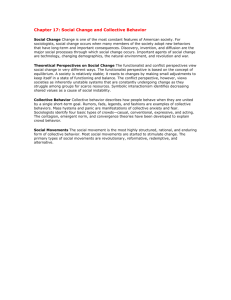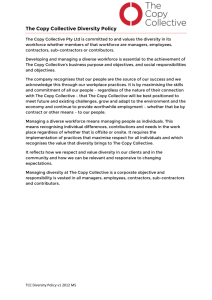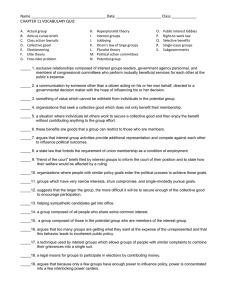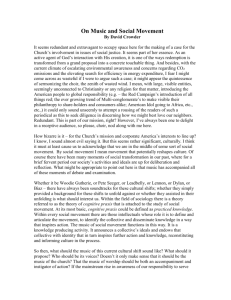What can you do?
advertisement
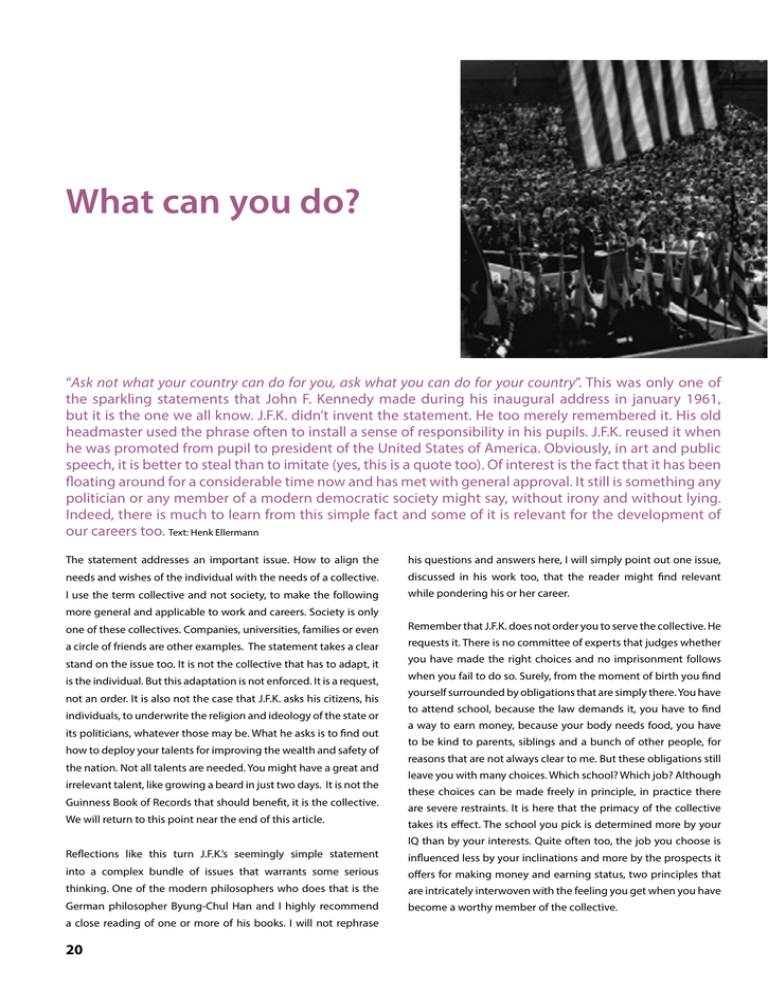
What can you do? “Ask not what your country can do for you, ask what you can do for your country”. This was only one of the sparkling statements that John F. Kennedy made during his inaugural address in january 1961, but it is the one we all know. J.F.K. didn’t invent the statement. He too merely remembered it. His old headmaster used the phrase often to install a sense of responsibility in his pupils. J.F.K. reused it when he was promoted from pupil to president of the United States of America. Obviously, in art and public speech, it is better to steal than to imitate (yes, this is a quote too). Of interest is the fact that it has been floating around for a considerable time now and has met with general approval. It still is something any politician or any member of a modern democratic society might say, without irony and without lying. Indeed, there is much to learn from this simple fact and some of it is relevant for the development of our careers too. Text: Henk Ellermann The statement addresses an important issue. How to align the his questions and answers here, I will simply point out one issue, needs and wishes of the individual with the needs of a collective. discussed in his work too, that the reader might find relevant I use the term collective and not society, to make the following while pondering his or her career. more general and applicable to work and careers. Society is only one of these collectives. Companies, universities, families or even Remember that J.F.K. does not order you to serve the collective. He a circle of friends are other examples. The statement takes a clear requests it. There is no committee of experts that judges whether stand on the issue too. It is not the collective that has to adapt, it is the individual. But this adaptation is not enforced. It is a request, not an order. It is also not the case that J.F.K. asks his citizens, his individuals, to underwrite the religion and ideology of the state or its politicians, whatever those may be. What he asks is to find out how to deploy your talents for improving the wealth and safety of the nation. Not all talents are needed. You might have a great and irrelevant talent, like growing a beard in just two days. It is not the Guinness Book of Records that should benefit, it is the collective. We will return to this point near the end of this article. you have made the right choices and no imprisonment follows when you fail to do so. Surely, from the moment of birth you find yourself surrounded by obligations that are simply there. You have to attend school, because the law demands it, you have to find a way to earn money, because your body needs food, you have to be kind to parents, siblings and a bunch of other people, for reasons that are not always clear to me. But these obligations still leave you with many choices. Which school? Which job? Although these choices can be made freely in principle, in practice there are severe restraints. It is here that the primacy of the collective takes its effect. The school you pick is determined more by your IQ than by your interests. Quite often too, the job you choose is Reflections like this turn J.F.K.’s seemingly simple statement influenced less by your inclinations and more by the prospects it into a complex bundle of issues that warrants some serious offers for making money and earning status, two principles that thinking. One of the modern philosophers who does that is the are intricately interwoven with the feeling you get when you have German philosopher Byung-Chul Han and I highly recommend become a worthy member of the collective. a close reading of one or more of his books. I will not rephrase 20 Academic Forum So, we have to ask, where is the individual? Where are your needs? Second, and perhaps more important, the needs of the collective One of the tenets of the work of Byung-Chul Han, is that those are of a certain type. A society needs wealth and safety, a company aspects are forgotten, or suppressed, or whatever term one needs profits, flexibility and, more often than not, constant prefers to use. The needs of the collective are internalized and innovation. Therefore, there are human talents and needs that tend to become the needs of the individual. The request to work are not specifically requested or catered for. The talent to grow a for the collective has become the motivation for the individual to beard is one, but more significant ones may be the need to give reach high and far. The old-fashioned ideas of an individual being a meaning to your life, the need for intimacy and friends, the suppressed by society are not applicable anymore. Reaching need to play and be uselessly creative. There may even be a need high and far, at least when successful, brings many rewards. You for boredom and laziness. Such needs, or wishes, are without become someone that matters. There is no suffering. Clearly, the doubt important in the life of an individual, but they rarely find collective benefits too. Wealth is improved and safety is increased. a place among the needs of a collective. This discrepancy may What more could one wish for? be inevitable, but it needs to be recognized. The very same discomforts mentioned above may be the result. “It is not the Guinness Book of Records that should benefit, it is the collective." Be aware of the limits. You have a limited amount of time and energy and most modern collectives only need part of you. When embarking on a career, never think that it will be fully compatible with your needs, whether it is a company or society. There is always a discrepancy and denying that can be dangerous. And to What is missing in this seemingly perfect alignment of the needs all those of you who will reach high and far, and who will take the and wishes of the individual with the needs of the collective are seats at the summits of the world, I beg you, when alone, please limitations, in at least two important ways. First, reaching high ponder the statement of J.F.K. in reverse and ask yourself too what and far in your career requires the investment of energy and society can do for you. And for me. time. No human being, no matter how talented and energetic, has an infinite supply of these two quantities. The collective will never stop to ask more, and even when it does not force you to do more, the simple fact that the request has been internalized implies that you will. What may follow are mental breakdowns. Many an observer has noted an increase in neuronal diseases like burn-outs, depressions, vague feelings of discomfort, chronic unhappiness, hyperactivity, etcetera. An individual may only digest a certain amount of collective needs, and when it becomes too much, his or her brain will constipate. Understanding Society Academic Forum where science meets society and life Expand your horizon, take the time to reflect www.tilburguniversity.edu/academicforum Asset Magazine 21

